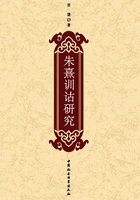
Abstract
This thesis takes Zhu Xi's Shi Ji Zhuan,Si Shu Zhang Ju Ji Zhu,Chu Ci Ji Zhu and Zhou Yi Ben Yi as main material,comprehensively uses the theory of exegetics,phonology,philology,lexicology,grammar,rhetoric and textualism,probes into Zhu Xi's exegetical principles and exegetical methods,and summarizes the achievement and insufficiency of Zhu Xi's exegesis.The content covers Zhu Xi's research in such fields as phonetics,character,vocabulary,grammar,rhetoric,collation,etc.,which elucidates the exegetical thoughts of Zhu Xi in an all-round way.The thesis is divided into seven parts to carry on the elaboration:
The introduction part makes a brief introduction to Zhu Xi's life and works,and then expounds the present research situation,significance and research approach of this selected title.
The first chapter summarizes Zhu Xi's exegetical principles on the whole,which reflect his attitude towards exegesis from different perspectives and almost throughout the entire exegetical process of Zhu Xi.
The second chapter takes Zhu Xi's interpretation of phonetics in ancient books as the research object and analyzes Zhu Xi's Xie Yin theory emphatically.The thesis gives a full understanding of its applied value in studying the actual pronunciation of the Song dynasty,and sums up Zhu Xi's exegetical thoughts embodied in the interpretation of phonetics at the same time.
The third chapter is the main part of this thesis,which takes Zhu Xi's interpretation of vocabulary in ancient books as the research object.It systematically elaborates Zhu Xi's exegetical methods and exegetical thoughts embodied in the interpretation of vocabulary,pointing out that Zhu Xi's introduction of epigraphy in the Song dynasty to the field of exegetics is a major breakthrough for tradition-al methods of exegesis.This chapter also makes the case analysis of Zhu Xi's achievement and insufficiency in vocabulary exegesis; the reasons leading to mistakes are discussed.
The fourth chapter takes Zhu Xi's interpretation of grammar in ancient books as the research object,focusing on Zhu Xi's achievement in the study of ancient Chinese function words.Zhu Xi's correct explanations of some grammatical phenomena,the methods used when parsing the sentences,especially the correction to predecessors'misinterpretation of certain function words,indicate that Zhu Xi already had a more advanced grammatical concept.
The fifth chapter takes Zhu Xi's interpretation of rhetoric in ancient books as the research object,analyzes Zhu Xi's description of some common rhetorical expressions at first,and then expounds the definition that Zhu Xi assigned to Fu,Bi,Xing and the differences between Zhu Xi and predecessor's annotation of Fu,Bi,Xing in Shi Jing and Chu Ci; the rhetoric phenomenon first proposed by Zhu Xi that Fu,Bi,Xing can be used together is also illustrated.
The sixth chapter takes Zhu Xi's collation of ancient books as the research object,summarizing the contents and methods of Zhu Xi's collation.On the method of collation,Zhu Xi has made a distinctive collation to the ancient books by utilizing a variety of collation methods synthetically according to the actual situation of error.
The thesis studies the contents and methods of Zhu Xi's exegesis in the synchronic plane,and investigates Zhu Xi's gains and losses against the background of the history of exegesis simultaneously.As to Zhu Xi's exegetical materials,the thesis both summarizes the exegetical principles from the macroscopic angle,and carries on the case investigation and analysis from the microscopic angle.In terms of theoretical summary,the thesis not only pays great attention to Zhu Xi's own understanding and cognition of exegesis,but also combines Zhu Xi's exegetical practice with these viewpoints,striving to draw reliable conclusions.
Key words: Zhu Xi; Exegesis; Phonetics; Character; Vocabulary; Grammar; Rhetoric; Collation
Chinese Library Classification number:H109.2